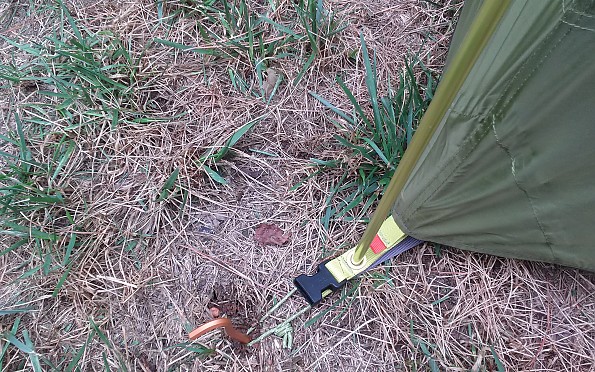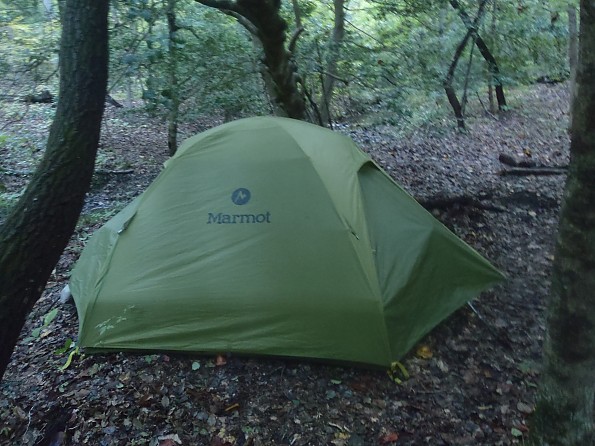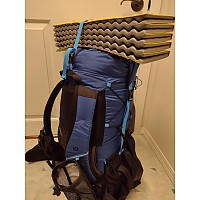Marmot Tungsten 3P

This is a solid tent for camping and short backpacking trips when comfort is king and weight a minor issue. It is spacious, thoughtfully designed, and well constructed. If you are going to use it for three people, make sure you know them well...I consider this a spacious 2-person tent.
April 2017 Update: After a full year and more of use, I would recommend it for rainy conditions but not high winds.
Pros
- Headroom
- Floorspace (for 2)
- Easy setup
- Price
- Vestibule space
- Rain protection
Cons
- Weight
- Longevity of new pole design?
- Sidewall vs mesh height
- Issues with pole design in wind (Apr 2017)
I bought the Marmot Tungsten 3P during a sale to increase my stable of options, but primarily to use on short backpacking trips with my wife as well as car camping. I have used the tent for a couple of camping trips in mild weather and one three-day backpacking trip with a full day and night of rain. It's packed up until next year as my next few trips will be solo, so I thought I would go ahead and review it now while it is fresh in the memory banks.
A couple of shots below from its initial setup: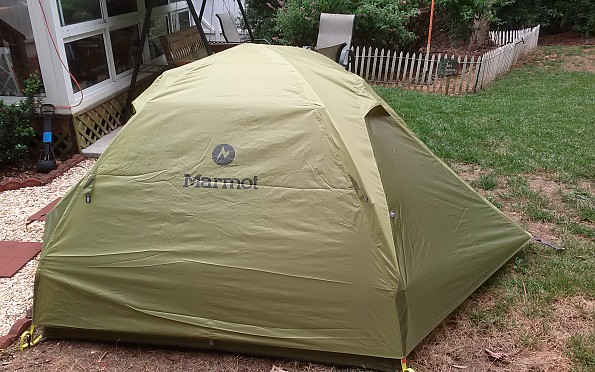
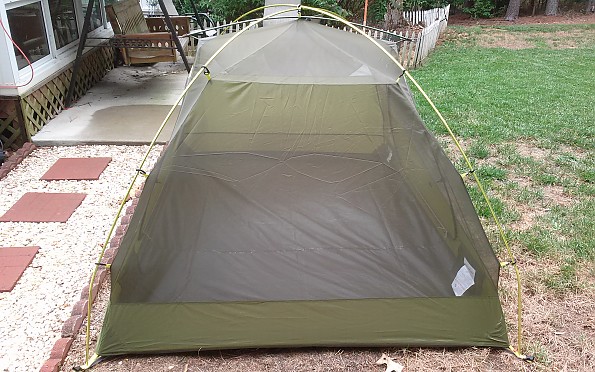
First, let's make clear what this tent is not: I would not recommend it for your primary multi-person backpacking tent. It is a relatively heavy tent for a 3-season, while not really having enough room in my opinion for the listed 3 people. I rarely agree with the 2 and 3 person sizing of most tents, as I think a better night's sleep is had when you are not disturbing each other.
Marmot lists the Tungsten 3P at 5 lbs 15 oz for the tent, fly and poles, and 6 lbs 5 oz with the groundsheet. My weight tests show it at 6 lbs 6 oz with everything including the stuff sack. Props to Marmot for its accurate weights.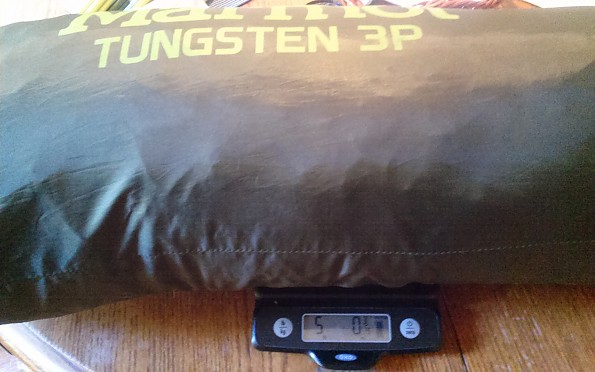
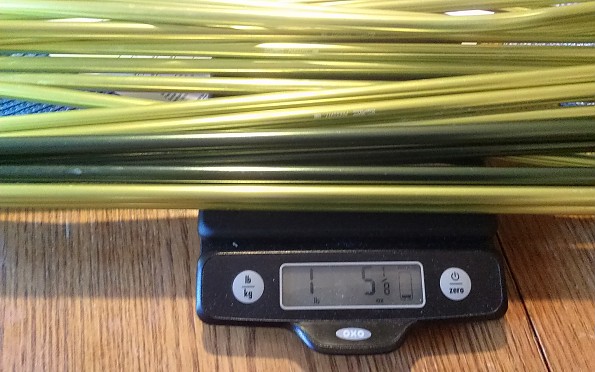
The setup is easy (one person can do it very quickly), with one primary multi-leg pole and a supplemental short pole to stretch out the tent roof and walls laterally. The footprint (which is included in the price), tent, and rain fly are color coded so orientation as you pull out each component is relatively easy.
The tent goes up quickly with the main pole being clipped to the tent with one central clip and three on each leg. The fly clips to the tent in each corner with a buckle, and the freestanding tent can be secured (including vestibules) with six stakes.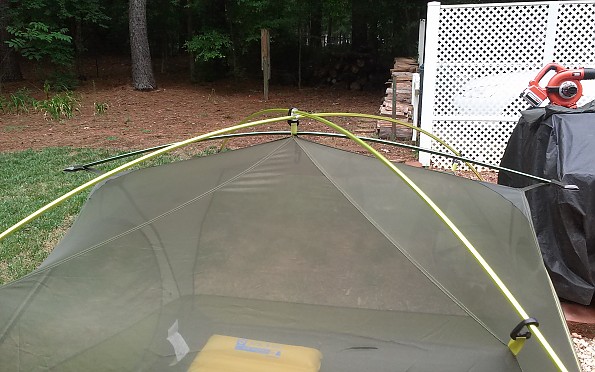
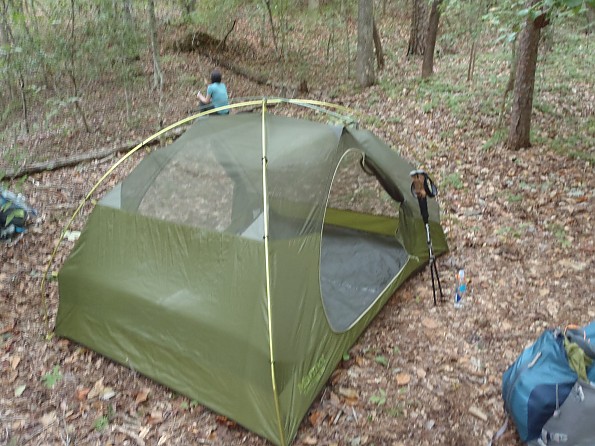
My first real test for setup was on a rainy trip in October, and it went up quickly and dry by laying out the rain fly first and working beneath that to lay out the footprint, tent and poles. It would have been difficult to stay dry without help, but then why would I be carrying this 6 lb beast if no-one was with me?
One note...the fly clips to the tent and does not attach to the poles so you can't rig a fly-pole setup with the footprint. This is the tent set up in the rain with our packs pushing the vestibules a bit further out.
The tent pitches well and the fly is easy to tighten. I have not had it out in anything more than a 20 mile an hour breeze and a decent amount of rain, but it held up well. We had a complete rainy day and night on the last trip, and there were no leaks through the taped seams (everything is factory sealed — I didn't do anything extra to it). The vestibules stayed dry and there was not a drop of moisture in the tent.
April 2017 Update: After a trip to Grayson Highlands last month with my wife, I wanted to add a note about the tent's ability to stand up to high winds. During a day and night of sustained winds and gusts well over 40 mph, I found that the ingenious pole design with the bend has a flaw, in my opinion...during the gusts the bend in the pole can act as a "pivot point" of sorts and the pole can rotate toward the tent causing the walls to sag. I guyed it out well but still had the issue. The poles and tent did not collapse but the tent wall buffeting about on the windward side was annoying.
As with all my tents, I blasted it with water from the hose at different speeds and multiple directions to simulate all kinds of rain/storms. Not a drop got inside and the ground inside the vestibules stayed dry except right around the edges.
There are two ridge vents that seem to work as well as any. We had no internal condensation in a day long rain and camping by a stream where I usually experience some moisture. There is adequate room between the fly and the tent wall to keep any condensation off the inner tent body and the vertical walls seem to help with that as well.
The vestibules have two zippers that allow the upper end to be opened and add to the venting, but with the shape of the tent (see description below) I don't think that is necessary if the rain is not coming in at an angle. 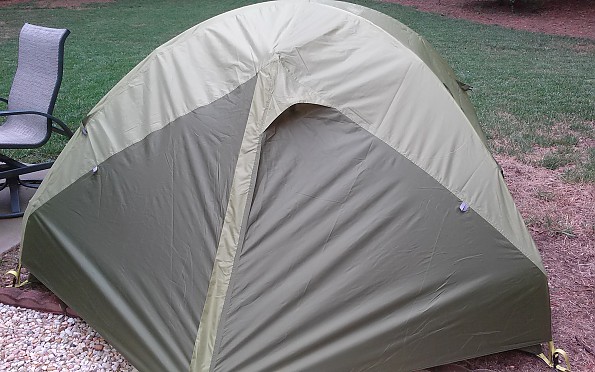
The only flaw I see in the ventilation will be with the inner tent walls. While I usually like a full mesh body down to the bathtub floor in a 3-season tent, the Tungsten 3P has an angled wall. Some folks might like this, but I think it could reduce the cross breeze through the tent on days when you want that to cut down on the heat.
We slept "upside down" so our heads were at the end with more mesh for better views. The higher mesh side walls at one end do give some privacy if that is something of concern to you (we don't usually camp in areas where that is an issue).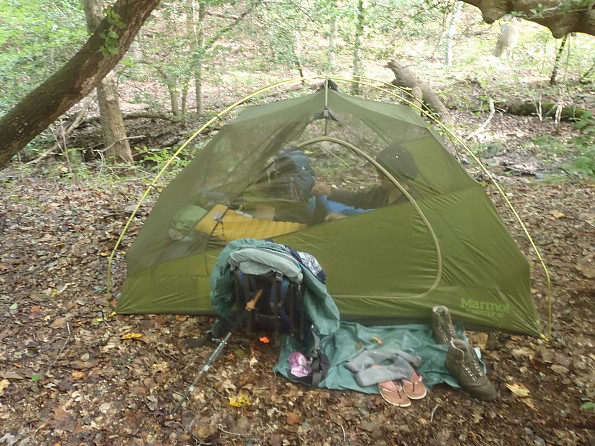
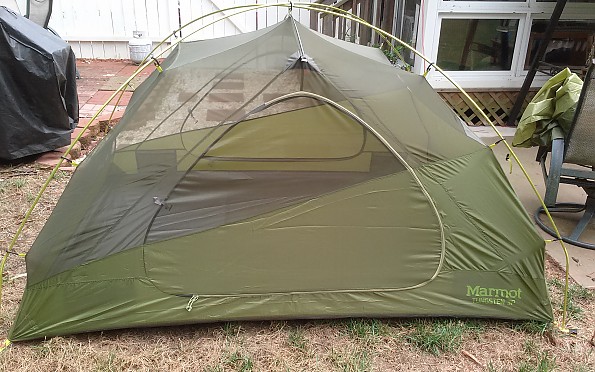
That said, the views, on nice nights when you just have to worry about bugs, are excellent. You can leave the fly hooked up on one end for a quick cover if it starts to rain.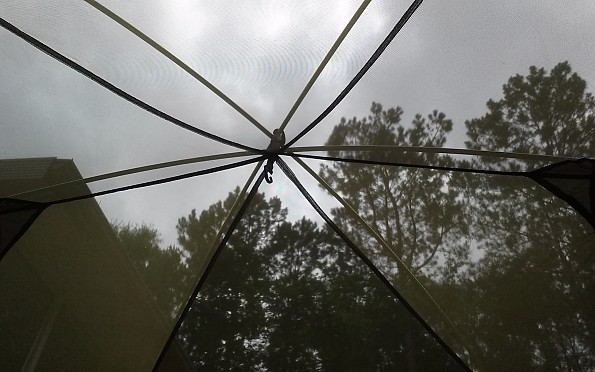
The standout feature in this tent, and the reason I bought it, is the roominess. Floor space is great for 2 people at over 40 sq. feet. However, it is the "usable" floor space that I like — area where there is enough headroom to sit up without issues and not have the tent in your face when lying down. The tent poles are designed with a bend in the bottom of them that stretches out the lower sides of the tent (Marmot calls this Volume Optimizing Structure).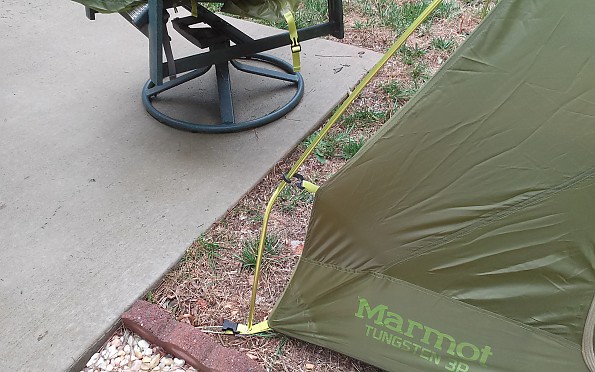
Here is a shot of the tent with my full length Nemo Astro Insulated Lite pad (72 by 20) and my wife's smaller NeoAir Xlite pad. We can fit those with tons of extra room for gear. The bent poles mean I have lots of head space when laying down rather than staring at the mesh or wall. You can also see the vertical nature of the side walls easily in this photo.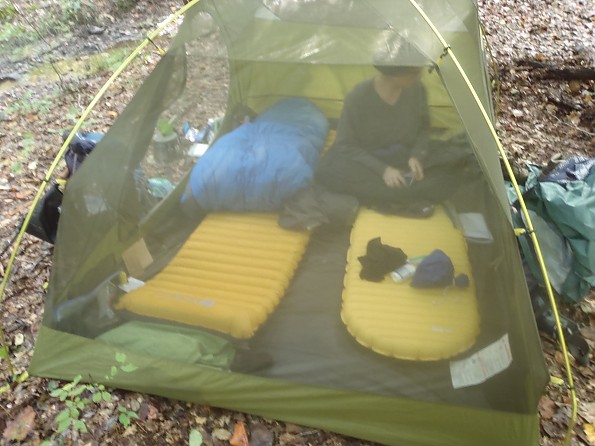
Due to this design, and the additional pole that stretches the tent roof and door walls out, there is a ton of room on the inside. I am 6 feet tall and can sit up straight without hitting the roof throughout most of the tent. It is just under 4 ft high in the center of the tent, and only slightly shorter near the doors.
This and the decent vestibule space really helps on those days when you are spending a lot of time in the tent during rain. In fact, the vertical nature of the side/door walls allowed us to leave the vestibules rolled back most of the time while it was raining and little moisture dropped into the tent (there wasn't a lot of wind).
April 2017 Update: See my note above about the tent's performance in high wind. The vertical nature of the tent walls still are outstanding in providing room to live on rainy days, but can have issues during high wind.
It's hard to tell, but in the photo below it is steadily raining and I have one half of the fly rolled back with no water entering the tent. The other half of the fly is covering my pack or I would have rolled it back too.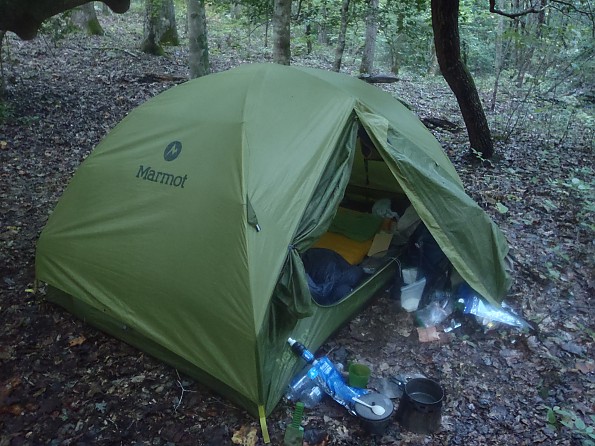
Gear storage is limited to a couple of typical pockets sewn into the walls as well as hooks in the ceiling. The pockets are placed near the door so they are useful whichever way you are oriented in the tent.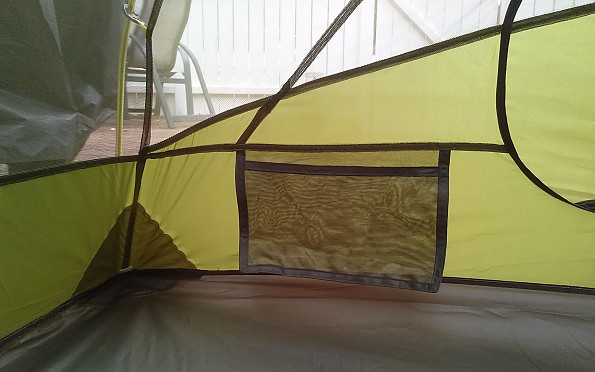
There are two additional "Lamp Shade" pockets in the end wall that Marmot has installed so you can slip a flashlight or headlamp into them and diffuse ambient light through the tent. We tried them out and felt that it worked well for general visibility, although we didn't use them much as they weren't bright enough to read by. 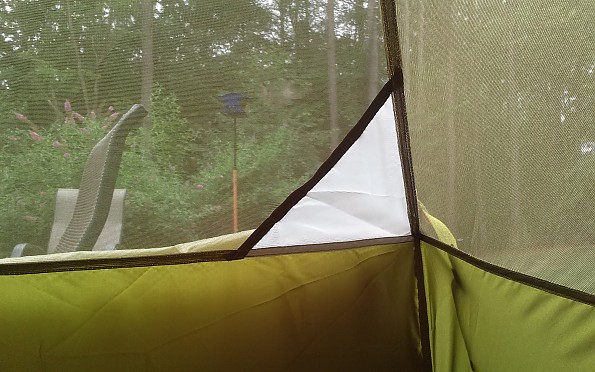
The vestibules are good size (10.6 and 7.8 sq ft) and kept all our gear dry throughout the rain. They also roll fully back to allow maximum venting, although the side walls discussed above may not help that. With the fly on, even rolled back, the view is a little limited because of the walls.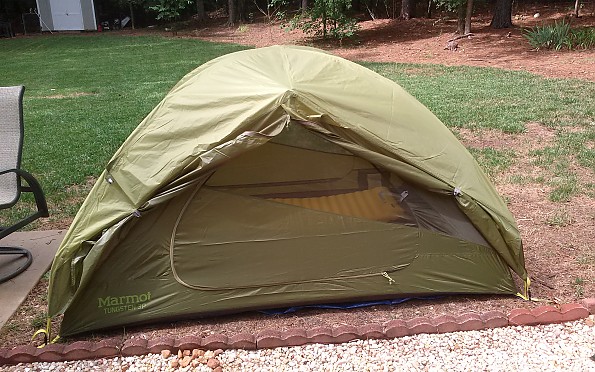
The tent fits easily into the stuff sack that is supplied, however I don't like the 22 inch length of this sack as it is wider than my pack. I put all the fabric components into a small sleeping bag stuff sack and that worked great. The pole system is quite large but as it is one piece it holds together well in the outer pocket of my pack. The smaller lateral pole is easy to pack as well. The supplied stakes are not my favorite so I immediately switched those out. I rarely have found that stakes I like come with a tent.
Construction seems excellent. The polyester taffeta floor (Specs: 68d Polyester Taffeta 190T 2000mm F/R) seem sturdy and the fly is made of similar material. I have found no flaws in the tent.
Durability is my only concern with the poles, as the unique bend that gives you more room also seems to have stressed the poles out. It is difficult to see in this photo, but the poles are discolored at the bend so may be slightly weaker in that area. The discoloration is right at the bend in this photo and stops about halfway between the bend and the clip (the rest is just light reflection).
This may not be a weakness (for all I know it may strengthen the poles), but it certainly will be something I will be watching over the years. It would be difficult to fit a standard pole sleeve over the bend if it broke there and still maintain the angle.
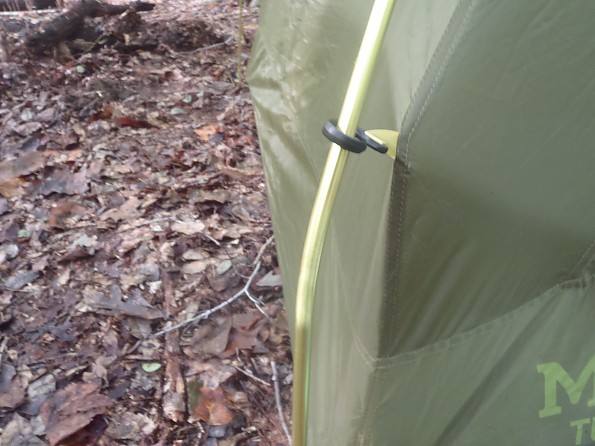 April 2017 Update: See my notes above about the pole bend rotating in high wind. There has been no weakness or signs of stress on the poles to date.
April 2017 Update: See my notes above about the pole bend rotating in high wind. There has been no weakness or signs of stress on the poles to date.
A couple of other features I like...the zippers are extremely quiet. I consider this another thoughtful design feature when sharing a tent, especially when you get to that age where middle of the night trips outside are a regular occurrence.
Finally, I really appreciate being able to purchase a tent in a color that blends into the woods. It just looks better to my eye, and doesn't add to today's all too common color pollution in the backcountry. There are reflective points on the tent so you can find it in the dark if you wander off too far.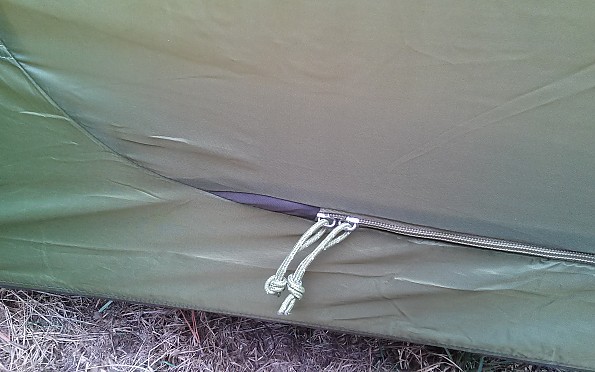
Overall, this is a thoughtfully designed tent that I would recommend for a couple of folks if you aren't planning to pile on the miles but intend to spend a good bit of time around camp, especially in rainy weather. Worth its heavy weight if that is your style on some trips. My wife and I are looking forward to many years of enjoyment and relaxing weekend trips in this home away from home.
Source: bought it new
Price Paid: $180
Had warranty issue with the poles, which Marmot Customer Service handled promptly and replaced the defective unit. Very happy with their responsiveness and overall product quality.
Pros
- Easy to set up
- Light for 2 people
- Nice tent for a wide range of camping adventures
- Dry and comfortable
- Like sleeping with fly peeled back or removed
Cons
- Had issue with poles, but was resolved quickly by Marmot.
- Stakes take a beating on hard ground (but most do).
This tent was an upgrade from our Sierra Designs 2P. We like the added space, with ease of setup and takedown. Makes it very easy for car camping and airplane travel.
Always been dry and well ventilated. With warranty issue, Marmot stepped up and replaced it, like for like.
We love this tent for quick weekends, week-long touring, and camping at sailing regattas. Like most tents, we added more stakes to make sure it could be pitched in stronger weather.
Background
Been using small to medium dome tents since 2005 for adventure travel across the globe. This was our third unit, with a 2-person and 6-person before. Nice compromise between space and poratability.
Source: bought it new
Price Paid: $200
Awesome tent, but custom pole set snapped off first time of use
Pros
- Everything else worked great
Cons
- Pole broke first use
Look, it's an awesome tent, but the custom poles failed very first time out, hence the poor rating. They have a fragile join between the poles and this came apart in my hands the first time I disassembled the tent. I then waited months for a replacement pole set from the UK.
Source: bought it new
Your Review
Where to Buy
You May Like
Specs
| Price |
MSRP: $299.00 Current Retail: $209.25-$299.00 Historic Range: $168.32-$299.99 Reviewers Paid: $180.00-$200.00 |
| Minimum Weight |
6 lbs 0.3 oz, 2,730 g |
| Packed Size |
23.2 x 7.1 in, 59.0 x 18.0 cm |
| Peak Height |
46.1 in, 117.0 cm |
| Floor Area |
40.9 sq ft, 3.8 sq m |
| Vestibule Area |
18.30 sqft, 1.70 sqm |
| Main Canopy Fabric |
100% Polyester, Ripstop |
| Floor Fabric |
100% Polyester, Taffeta |
| Fly Fabric |
100% Polyester, Ripstop |
| Pole Material |
Velocity HD Aluminum |
| Number of Doors |
2 |
| Number of Poles |
2 |
| Seasons |
3-season |


